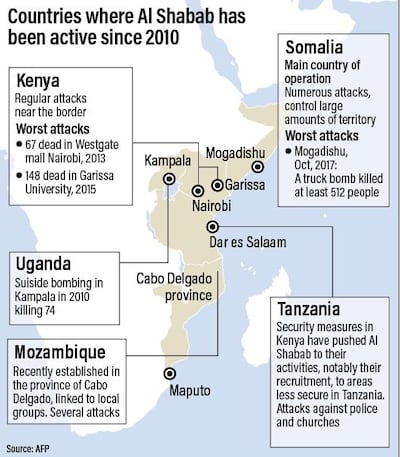Shortly after gunmen launched an attack on an upmarket Nairobi hotel on Tuesday afternoon, the SITE intelligence group picked up a claim of responsibility from the Al Shabab militant group.
In the coming hours, the east African militant group, whose name means “The Youth” in Arabic and is an abbreviation of the Mujahideen Youth Movement, issued updates on the ongoing attack, calling the location “one of the most opulent areas of the Kenyan capital… where offices of international representatives are present,” according to SITE, which monitors extremist groups.
Tuesday's attack, in which 14 people were killed, illustrates that Al Shabab remains powerful, despite ongoing counter-terrorism efforts by the United States and Horn of Africa nations.
Al Shabab, which is based in Somalia but has become known for carrying out brutal attacks in neighbouring Kenya, remains Al Qaeda’s most active affiliate, says Rita Katz, the Director of SITE Intelligence Group.
The group consistently claims the largest number of attacks and suicide operations, maintains a large area of territory, and is focused on expanding into neighbouring countries, she tweeted on Tuesday.
The group was founded as the militant wing of the Islamic Courts Union, a group of hard-line Sharia courts in southern Somalia that controlled Mogadishu in 2006 and challenged the Transitional Federal Parliament for control of the country.
After Ethiopian forces drove the ICU from the Somali capital in late 2006, Al Shabab continued fighting the United Nations-backed Federal Parliament independently.
The group gained notoriety for gruesome suicide attacks while advocating a severe doctrine that saw the group stoning to death women accused of adultery and amputating the hands of thieves.
While initially receiving support from sectors of the Somali public fed up with two decades of insecurity, these acts repelled many. Al Shabab were driven from the Somali capital by African Union troops in 2011 and out of the port city of Kismayo the next year.
A 2012 video showed then Al Shabab leader Ahmed Abdi Godane pledging allegiance to Al Qaeda leader Ayman Al Zawahiri. Al Shabab debated joining ISIS in 2014 but eventually only a small splinter faction pledged its loyalty to its leader Abu Bakr Al Baghdadi.
After Godane was killed in a US drone strike in the same year, Al Shabaab has been led by Ahmad Umar, who is believed to command between 7,000 and 9,000 fighters.
The group raises funds from a highly developed system of extortion that rivals the Somali government's tax system, collecting levies from charcoal exports, agricultural products, and goods in transport via a network of checkpoints on roads across southern and central Somalia.
In March 2017, President Donald Trump expanded military action against Al Shabab, which saw the US increase airstrikes on Somalia. At least 40 strikes were carried out in 2018 and 35 the year before.
The Bureau of Investigative Journalism estimates over 400 people were killed in these strikes, a higher number than the previous 10 years combined.
Some 500 US troops are now deployed on an “advise and assist” mission in Somalia.
The death of an American soldier in Somalia in May 2017 was the first since the disastrous 1993 Black Hawk down incident in which 18 US soldiers died. But so far the increased military action against Al Shabab has failed to dent the group’s effectiveness.
“Even though airstrikes have killed hundreds of [Al Shabab] fighters, the group still has significant capability to carry out terrorist attacks,” Al Shabab experts Harun Maruf and Dan Joseph wrote in report for the Combating Terrorism Centre at Westpoint Military Academy in December. Al Shabab “has not been weakened in the past year as a terrorist force”.
________________
Read more
Kenya will remain target as long as troops in Somalia
Death toll from Nairobi attack rises to 21 and 50 unaccounted for
Kenya attack: Al Shabab claims assault on Nairobi hotel complex



















